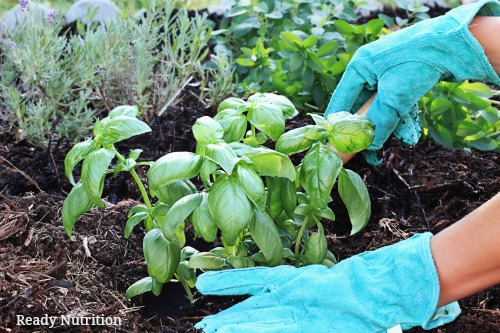Growing medicinal plants are a great way to ensure garden sustainability and more notably, have access to natural medicine when you need it most. When I introduced more herbs in my garden, I noticed it had a profound impact on the vegetables and fruits I was growing. It also encouraged beneficial insects and birds to visit my garden and this helped cut down on plants being eaten.
Because of this observation, I changed my focus from solely growing to eat and, instead, worked to create a welcoming growing environment. Not only were my plants healthier, but I had access to natural herbs to use for making extracts and poultices. The following are reasons I feel gardeners should adopt adding medicinal herbs to the garden.
7 Reasons Why You Should Have a Medicinal Garden
- Have access to multiple forms of natural medicine for future needs. When you have fresh cut herbs to use for natural medicine, you have access to the freshest forms of their healing properties. For example, what if you cut your hand and did not have a bandage. Did you know that the sage leaf can be wrapped around a wound and used as a natural band-aid? Or, if the bleeding from that cut was so bad that it wouldn’t stop. Did you know that a few shakes of some cayenne pepper can help control the bleed? Or, if you have a severe bruise, make a poultice. It’s one of the easiest and fastest ways to use herbal medicine.
- Calm your senses with medicinal teas. Herbs like lavender, lemon balm, chamomile, catnip, and peppermint have a natural sedative quality to them to help calm your spirits or help you sleep better at night. Taking a handful of leaves and adding them to a cup of hot water will create a soothing cup of herbal tea. Here are some great herbal tea remedies to start with.
- Many medicinal plants and herbs are perennials and will come back year after year. The more established the plants are, the more they will produce each year. This will save you money in the long run! I bought a small oregano plant three years ago and it is the size of a small shrub. I have so much oregano now that I can use it for culinary uses and experiment with making my own tinctures and astringents. As well, my echinacea has produced so many “baby” plants that I have dug them up and transferred them to another part of my property where I am creating another medicinal garden.
- Feed your livestock! Livestock can also benefit from growing herbs in the garden. Not only can they be added for additional nutrition, but you can use herbs to make natural cleansing shampoos and even clean wounds. Some herbs I feed my animals are oregano, comfrey, lavender, mint, and sage. Note: not all herbs are healthy for your livestock, so do research to find out which ones are good for your animals.
- Another added benefit of having a thriving medicinal garden is that bees love it! This promotes bee sustainability and a healthier garden, as well. The blossoms put out by the flowers and herbs will attract bees that will, in turn, happily pollinate your vegetable and fruits. Consider planting some of these beneficial flowers in addition to herbs:
- Asters (Aster/Callistephus)
- Sunflowers (Helianthus/Tithonia)
- Salvia (Salvia/Farinacea-Strata/Splendens)
- Bee balm (Monarda)
- Hyssop (Agastache)
- Mint (Mentha)
- Cleome / Spider flower (Cleome)
- Thyme (Thymus)
- Poppy (Papaver/Eschscholzia)
- California poppies (Eschscholzia)
- Bachelor’s buttons (Centaurea)
- Lavender (Lavandula)
- Regrow from cuttings on your windowsill. Herbs like rosemary, lavender, mint, cilantro, oregano, marjoram, basil, sage, lemon balm, and thyme are perfect for starting in a glass or canning jar. Simply add water and set in indirect sunlight – it’s that simple! Read more here.
- Herbs can be great companion plants for the vegetable garden. Don’t feel handcuffed to only growing vegetables, but herbs can be planted nearby to do double duty as companion plants. Companion planting can also help control the insect balance in your garden and repel some of the more unwanted guests like mosquitoes. Some favorite companion herbs are pairing basil with tomatoes, chamomile near cucumbers, garlic planted near apple, pear and peach trees, roses, cucumbers, peas, lettuce or celery. Read more about which herbs are great companions here.
Ready Nutrition writer and herbalist, Jeremiah Johnson has written extensively on how to cultivate a medicinal garden to use in a long-term emergency. His favorite medicinals are what he refers to as the 3 G’s: garlic, ginger, and ginseng. You can read his article on the subject.
To better understand natural medicine and using herbals for health, I strongly recommend you read more on the subject. The following books come highly recommended:
Herbal Antibiotics: Natural Alternatives for Treating Drug-Resistant Bacteria,” by Stephen Harrod Buhner.
Prepper’s Natural Medicine: Life-Saving Herbs, Essential Oils and Natural Remedies for When There is No Doctor, by Cat Ellis (Herbal Prepper)
This is not a new gardening concept, yet is still not widely used. When you are planting your garden, consider adding a few herbs and watch the benefits grow before your eyes.




